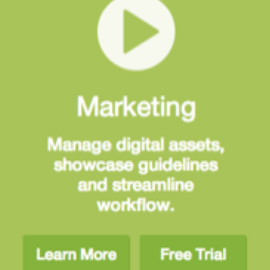IntelligenceBank, a software start-up that helps enterprises move to the cloud, has opened its online store, delivering on a $2 million funding round last November to build a compelling online sales channel.
The Melbourne company put out three SaaS apps – Digital Asset Management and BrandHubs; Online Board Portal and Business – in line with its strategy to slice and dice, and offer specific products and solutions, rather than an overarching system. Also in the pipeline are apps on Risk and Compliance Registers, and Data Rooms.
“The new ecommerce facility has been developed in response to global demand to purchase IntelligenceBank online, as well as to offer flexible payment arrangements, such as monthly billing with a credit card,” said CEO Tessa Court. “This initiative is a crucial part of our global scale strategy and we are already seeing positive results.”
IntelligenceBank was co-founded in 2009 by the American-born Court and her husband Peter. It last year raised funds from the Melbourne venture firm Kings of the Jungle.
With the launch of the online apps, the company is setting a goal of signing up 550 online-only clients over the next 12 months. IntelligenceBank’s apps like BrandHubs are bought by large organizations with complex branding structures, such as NAB and Santos, while a Digital Asset Management platform is usually sought by firms with under 40 users. The Board Portal has a well-defined niche with government, non-profits, small listed companies and financial/professional services organisations.
IntelligenceBank was originally sold as a single platform that could be used for a variety of use cases. However, this posed challenges. It was hard for potential customers to fully comprehend the value of the offerings. Explaining directly would work, but in order to scale the business, IntelligenceBank believed it needed people to instantly “get it” from our website, and sign up for a trial and buy.
So IntelligenceBank changed to offering specific solutions, besides choosing the SaaS model, which brought its own unique set of challenges.
“The key difference between a direct sales online product with implementation and pure SaaS model are very different from both a product development and marketing perspective,” Court told Anthill. “With regards to product – usability and having tools to ‘self-implement’ is crucial – and this somewhat draws out the normal development lifecycle.”
From a marketing perspective, the SaaS model requires one to continually “AB test, optimize the sales funnel and simplify the sign-up process.” That said, the effort and extra time it takes is well worth the scale that an online sales channel gives the business, she added.
IntelligenceBank now plans to build a reseller network, as well as a developer program so other developers can build their own apps on “our infrastructure.”
IntelligenceBank, is a 2013 graduate of the Springboard Technology Accelerator program for women-led technology companies, operates in a global SaaS market estimated to be worth $75 billion in 2014, according to Forrester Research. Its current clients include Suncorp, Ballarat Regional Tourism, Nokia and National Australia Bank. Besides Australia and New Zealand, it has clients in Asia, Europe and the United States, where it has opened an office in New York. Last year, it was listed in Deloitte Asia Pacific’s Fast500 Technology Business ranking.







![Learn how to devise winning business ideas in four steps with Martin Martinez [CHEAT SHEET]](https://anthillonline.com/wp-content/uploads/2015/07/Screen-Shot-2015-11-26-at-13.44.27-100x75.png)
![Five essential things to get right if you want to raise capital, with Bryan Vadas [FREE CHEAT SHEET]](https://anthillonline.com/wp-content/uploads/2015/08/vadas-3d-cover-01--100x75.png)
![Five ways to manage your time by managing yourself, with Helen Ebdon [CHEAT SHEET]](https://anthillonline.com/wp-content/uploads/2015/07/ebdon-3d-cover-01--100x75.png)
![Four Page Digital Marketing Strategy [FREE RESOURCE]](https://anthillonline.com/wp-content/uploads/2015/01/FOUR-PAGE-IMAGE-100x75.png)
![How to price your product or service in 8 steps with Steve Major [FREE INFOGRAPHIC]](https://anthillonline.com/wp-content/uploads/2015/07/Screen-Shot-2015-11-26-at-11.40.10-100x75.png)

![Do you want to innovate more? Then you need to become a “now-ist” [VIDEO]](https://anthillonline.com/wp-content/uploads/2014/07/idea-bulb-300x300.jpeg)
![How to secure lucrative sponsorships in five steps [CHEAT SHEET]](https://anthillonline.com/wp-content/uploads/2016/02/jackie-fast-meme-04-300x194.jpg)
![Learn how to use Instagram as a business tool [FREE INFOGRAPHIC]](https://anthillonline.com/wp-content/uploads/2012/12/nickelbackinstagram-100x75.jpg)
![Want more credibility and influence? Unlock the 12 principles of persuasion checklist [FREE DOWNLOAD]](https://anthillonline.com/wp-content/uploads/2016/03/james-persuasion-and-influence-nfsu-02.pdf-Box-2016-03-24-15-09-44-100x75.png)
![Do you have happy staff? 5 ways to improve performance [FREE DOWNLOAD]](https://anthillonline.com/wp-content/uploads/2016/06/chris-smith-cheatsheet-04c.pdf-Box-2016-06-30-20-45-20-100x75.png)
![Three easy wins when using LinkedIn with David Hobson [FREE REPORT]](https://anthillonline.com/wp-content/uploads/2015/08/3quick-wins-100x75.png)
![New Zealand’s Xero eyes US IPO, further disruption as subscribers increase [INFOGRAPHIC]](https://anthillonline.com/wp-content/uploads/2014/07/sruuuuujana-212x194.png)
![Ever wonder if your ‘content marketing’ is really just crap? You gotta see this! [INFOGRAPHIC]](https://anthillonline.com/wp-content/uploads/2014/08/content-100x75.jpg)
![7 Business Lessons From Game of Thrones [INFOGRAPHIC]](https://anthillonline.com/wp-content/uploads/2014/10/infographic-games-of-thrones-041-100x75.jpg)
![How to build your own Media Empire… In seven steps with Nathan Chan [INFOGRAPHIC]](https://anthillonline.com/wp-content/uploads/2014/10/Nathan-Chan-Infographic-e1413419529176-100x75.jpg)
![5 Business Lessons From Tinder [INFOGRAPHIC]](https://anthillonline.com/wp-content/uploads/2014/10/Tinder-Elegant-Infographic-100x75.jpg)



